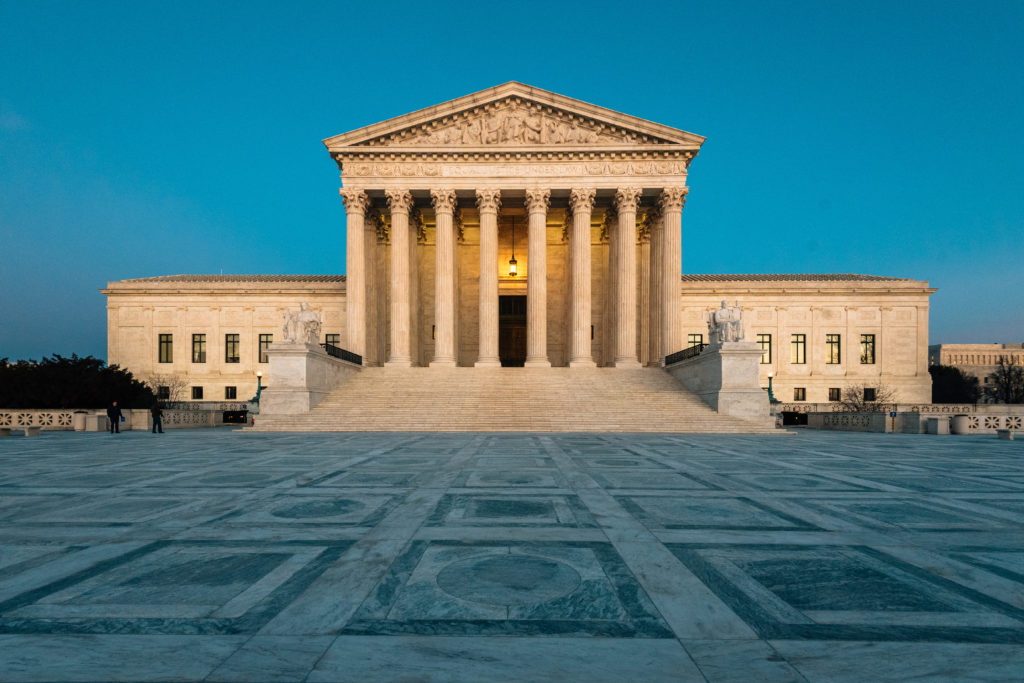It is reported that Justice Breyer will retire from the Supreme Court, opening the way for President Biden to nominate his replacement, which in a deadlocked Senate may occasion intense horse-trading and arm-twisting. Let’s hope it does not result in the spectacle and shameful actions that we’ve come to associate with confirmation hearings.
I’ve sometimes thought that one mark of a healthy polity would be the virtual anonymity of the Supreme Court. They’re unelected and with tenure so there is no need for justices to be in the public eye. Outside of a few academics, attorneys, and political watchers, there’s little occasion, and really no need for the average citizen to have much knowledge or care about the justices, unlike members of Congress who ought to be accountable to the public as part of the normal process of representation and election.
That the confirmation hearings are “must watch TV,” and that so much seems to depend on their outcome, are signs that something is amiss with the Court. The Federalist Papers describe the Court as the “least dangerous” branch of government, having “neither force nor will, but merely judgment,” lacking even the power to impose its judgment without the executive branch. Article III of the Constitution enumerates the cases and controversies over which the federal judicial power extends, and nothing in that article suggests the Court should properly be the theater for identity politics or culture war.
A healthy polity would have little occasion to obsess over the Court, but our own polity knows just how much power the Court has arrogated to itself. Ordinary citizens hit the refresh button on their browser to await news of who shall live or die—and at what age—marry or not, be forced to violate their conscience or not, and on and on it goes.
Start your day with Public Discourse
Sign up and get our daily essays sent straight to your inbox.President Biden promised to bring unity to the nation. That is impossible so long as the Court is activist and does not adhere to originalism, since the Court’s task is to interpret law, never to create, and to follow the Constitution rather than invent it.
Public Discourse has hosted arguments about the Court since the publication’s inception. Here, from our archives, are some essays that remain timely, and that might provide some needed perspective on the role of the Court, originalism, and the role of morality and natural law in the Court. Our authors don’t always agree, of course, which is helpful as we again await a nomination and confirmation of a justice to the Supreme Court. These articles might be helpful to the president and his advisors as well.
The Court can operate as intended only if judicial supremacy is rejected, argues Brian Bird in “The Case Against Judicial Supremacy.” The republican regime in which we live assumes self-government, and the function of the Court should be understood against the background of the kind of political community we inhabit.
Further, Carson Holloway defends originalism as the “commonsense, traditional American approach to constitutional interpretation.” It’s not a new idea of recent vintage but captures the spirit and intention of the Constitution itself, as well as of the people who agreed to the Constitution. But as we know well, originalism is not held by everyone, and “the principles of natural law and natural rights on which the Constitution” was founded have diminished meaning and power for many, which, as S. Adam Seagrave argues, has troubling implications for our future.
However, there is reason to ask if the Constitution itself requires a kind of blind allegiance to the text or if “metaphysical and moral truths that lie beyond it” ought to be used when judging. Gerard V. Bradley explores this in his “Moral Truth and Constitutional Conservatism,” and a particular instance of that sort of debate can be found in the exchange between Hadley Arkes and Matthew Franck, with Franck suggesting that “if judges are authoritative arbiters of the ‘logic of morals,’ we have subjected ourselves” to the legal elite. Against this, Arkes insists, as he else elsewhere in our pages, that law is hardly binding because it is old, or our tribe’s, but that the very “logic of law” is part of anything that “plausibly calls itself ‘the rule of law.’”
Supreme Court nominations have become momentous; for some, they’re even a dominant reason to vote as they do in presidential elections. That’s for the worse, it seems to me, and we’d do well to think again about the purpose and powers of the Court.
Best wishes from all of us at Public Discourse. Thanks for reading.











